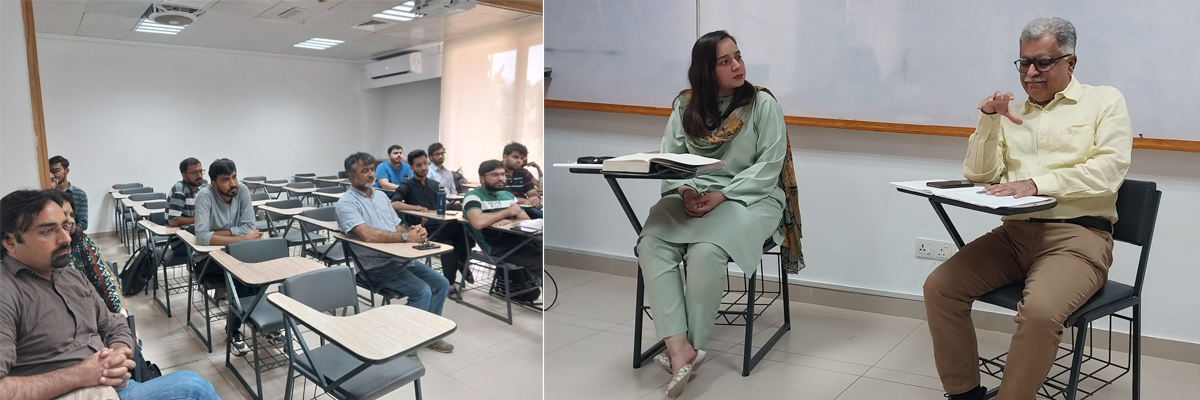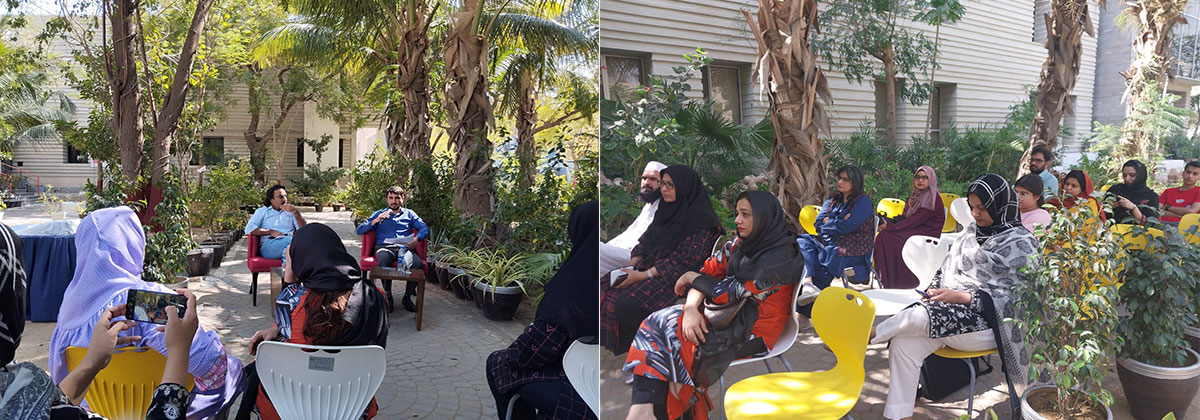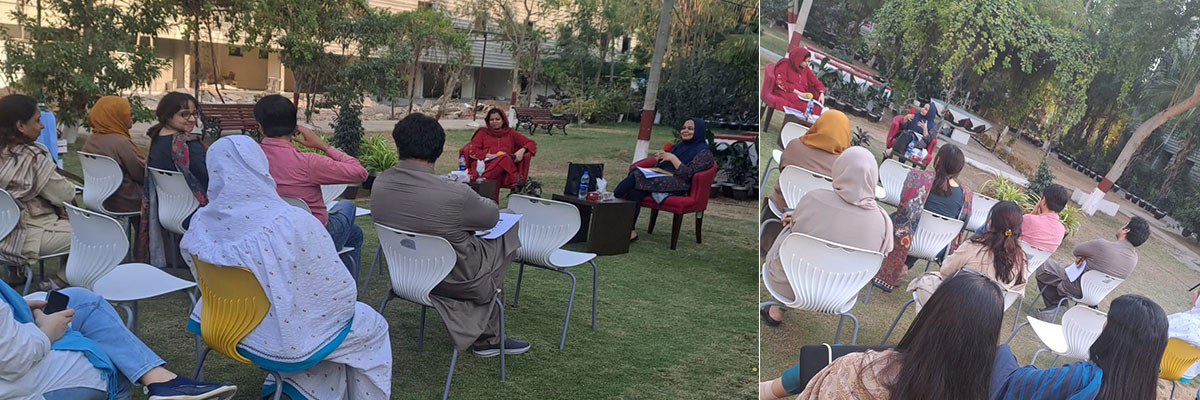News
Social Inequality Lab Meeting
On June 18, 2025, the Social Inequality Lab held its annual meeting with the Lab's fellows. The Lab reaffirmed its commitment to producing policy-relevant research on the structural drivers of inequality, including disparities in income, wealth, gender, education, and access to public services. Key discussions included enhancing student engagement, launching an Inequality Dialogue Series, and setting a regular calendar for meetings and events. Fellows proposed expanding the Lab's network to include more researchers, and identifying new areas of collaborative research. Plans were discussed for capacity-building workshops, including spatial software training, and a commitment was made to compile a volume of essays on inequality for policy audiences. Fellows also agreed to include exceptional student theses in an edited book and to pursue joint grant applications. The meeting reflected a shared vision to deepen research, broaden participation, and influence policy discourse on inequality in Pakistan and beyond.

The Great Leveler: Violence and the History of Inequality from the Stone Age to the Twenty-First Century
The Social Inequality Lab organized its third book talk on 7th May 2024. Dr Haider Nizamani moderated the session and Javeria Abbas was the discussant for the book “The Great Leveler: Violence and the History of Inequality from the Stone Age to the Twenty-First Century” by Walter Scheidel. The talk explored how inequality has increased across all of human society under every form of political organisation since the Stone Age. The talk centered on the following overview of the book:
"Are mass violence and catastrophes the only forces that can seriously decrease economic inequality? To judge by thousands of years of history, the answer is yes. Tracing the global history of inequality from the Stone Age to today, Walter Scheidel shows that it never dies peacefully. The Great Leveler is the first book to chart the crucial role of violent shocks in reducing inequality over the full sweep of human history around the world. The “Four Horsemen” of leveling—mass-mobilization warfare, transformative revolutions, state collapse, and catastrophic plagues—have repeatedly destroyed the fortunes of the rich. Today, the violence that reduced inequality in the past seems to have diminished, and that is a good thing. But it casts serious doubt on the prospects for a more equal future. An essential contribution to the debate about inequality, The Great Leveler provides important new insights about why inequality is so persistent—and why it is unlikely to decline anytime soon."

Dialogue by Social Inequality Lab, IBA Karachi
The Social Inequality Lab organized a one-day workshop on 1st March 2024, featuring distinguished speakers and thought-provoking topics on inequality. This event was graced by the former federal minister Aisha Ghaus Pasha and her presence underscored the urgency of nuanced understanding and actionable policy initiatives in combating social inequality. Akbar Zaidi, Executive Director, IBA and Asma Hyder, Dean SESS, gave the welcome note and introduction of the lab. Invited speakers contributed diverse perspectives to enrich the scholarly dialogue. Renowned academician and economists from IBA, LUMS, other universities and institutions participated in the discourse.
Abid Aman Burki, contributed invaluable insights into the trends of income inequality in Pakistan and why do these trends exist. Using the household survey of thirty-year period from the year 1991 to 2020, inequality was measured between the groups and within the groups, while the main focus was on between the groups. Mohammad Nasir's elucidation of inflation inequality underscored the disproportionate impact of rising prices on lower-income households. The impact of inflation needs to be analyzed at every level (decile) as the monetary policy affects every decile differently. Farooq Pasha stressed that the need of the hour is an inclusive monetary policy. Jon Jellema's critique of Pakistan's fiscal policies highlighted systemic inadequacies in addressing poverty and inequality effectively, whereas Moritz Meyer's examination of spatial disparities illuminated the stark regional variations in poverty prevalence, necessitating targeted interventions. Engaging discussions among participants fostered interdisciplinary dialogue and catalyzed aspirations for tangible societal change. It was discussed that economic growth, by increasing real income and affordability of goods and services, can contribute to reducing inequality by lifting individuals out of poverty and expanding their opportunities.
The participants also visited the Social Inequality Lab office to discuss the future research agenda. This seminar fostered critical discussions, explored emerging research paradigms, stimulated interdisciplinary dialogue on the various dimensions of inequality, and inspired actionable initiatives for a more just and equitable society.
For more details, please click here.

Visions of Inequality; From French Revolution to the end of Cold War
The Social Inequality Lab organized its second book talk on 26th February 2024. Dr Faiz ur Rehman moderated the session and Adnan Ahmad was the discussant for the book “Visions of Inequality; From French Revolution to the end of Cold War” by Branko Milanovic. The talk explored the evolution of inequality and income distribution as described in the book from the perspective of different philosophers. The talk centered on the following main concepts and key take away from the book:
“Before the French revolution, Physiocrats believed that surplus is needed for a society to flourish. They argued that agricultural work must produce a net income above the wages paid to the workers, for it is this net product that allows other classes to exist. Adam Smith, in contrast, focused on income distribution and opposes the role of Capitalists in policy making. He supports the real income of the workers because this constitutes the overall wealth of nations. Ricardo, on the other hand, ignores the working class and argues that the income of the capitalists is crucial for progress. According to him, machinery in the short run reduces demand for labor but in the long run it improves workers’ standard of living. Karl Marx does not agree with capitalism, he says that capitalists will always exploit the working class and that is why he proposes secular increase in real wages. According to him, focus should be on abolishing the class structure rather than marginal alterations in income inequality. Pareto shifted the focus to interpersonal income inequality. He provided a trade-off between efficiency and equity and supported efficiency over equity. Simon Kuznets does not agree with Pareto by arguing that inequality is not fixed across socioeconomic systems, there is a clear link between income inequality and structural changes or rising mean income.”

The Social Inequality Lab organized an engaging book talk on "Inequality Reexamined" by Amartya Sen.
The Social Inequality Lab organized an engaging book talk on "Inequality Reexamined" by Amartya Sen. Published in 1992, the book challenges traditional approaches to measuring inequality solely through income and wealth distribution, advocating for a broader understanding that encompasses capabilities, functioning, and freedoms as essential components of human well-being. The talk emphasized the significance of the book in reshaping discussions on poverty, inequality, and development. The book's exploration of the capability approach, a central theme, was highlighted as a key aspect that distinguishes Sen's work. The talk also delved into concepts such as equality, and social justice theory. Connections with classical economists like Adam Smith and Marx were explored, paving the way for a nuanced discussion on happiness and its link to Sen's theories. Examples from China and the USA were discussed to underscore the limitations of traditional development indicators. The discourse then navigated through normative and positive aspects of equality, Sen's critique of Welfare Economics, and the policy implications.
Engaging questions from the audience further enriched the conversation. Topics ranged from the Scandinavian countries' happiness index to the relevance of GDP and GNI per capita in measuring poverty alleviation. The book talk provided a comprehensive exploration of Amartya Sen's "Inequality Reexamined," offering valuable insights into the capability approach, critiques of traditional indicators, and the nuanced interplay between inequality, development, and happiness.

2nd meeting of Lab's fellows
The Social Inequality Lab had the second meeting with its esteemed fellows on 20th December 2023. The discussion centered on the importance of identifying the causes of inequality. To have a more detailed discourse on this topic, it was proposed to organize a workshop in the coming months. Further dedicated researchers will be identified who can mentor students who want to pursue this topic in their thesis. It was decided that the lab will develop an archive for data on inequality. This will facilitate people to get reliable data in one place. The meeting ended with a proposition to also initiate a lecture series from the platform of the Lab.
Poverty Through Your Eyes
The Social Inequality Lab organized a competition "Poverty Through Your Eyes". It was part of the World Bank's initiative "Reforms for a Brighter Future: Time to Decide." The Young Voices competition aimed to stimulate debate on critical economic development issues facing Pakistan, encouraging young individuals aged 16 to 25, to vocalize their perspectives on these challenges. The theme, "Poverty Through Your Eyes," garnered a total of 302 submissions nationwide, including essays, videos, artwork, and poetry. Out of the total submissions 2/3rd of them were by females. The submissions were received from 35 different cities of Pakistan. More than 50% were essays followed by poetry 24%.
The judging process for these 302 submissions was transparent and comprehensive. We made seven sub-committees comprising of experts in the field. Each submission was evaluated by two judges based on a score sheet, which encompassed various criteria. Judges reviewed submissions independently and assessed them based on these criteria. Then the top 20 entries were judged by the final committee to choose the seven winners. We awarded prizes to 3 essays, 2 videos, 1 artwork and 1 poetry. Each winner won a cash prize of PKR 50,000. Additionally, they were invited to attend the conference at IBA "Challenging Linearity" organized by SESS and CBER. All the participants received a certificate in recognition of their work. Selected pieces will be used in future by the World Bank for their policy note reports. The Social Inequality Lab converted most of the submissions in a video format for viewing. The video can be viewed here.
Course offered on Poverty and Inequality (Dev 563) for MS Development Studies in Spring 2023:
Course Description
'The greatest single problem and danger facing the world of the third millennium ..is the gap in wealth and health that separates rich and poor' (David Landes, The Wealth & Poverty of Nations).
Scholars, policymakers, and activists quibble over ending poverty in the globalized world.
This is a reading intensive graduate seminar focusing on a small number of core texts representing influential views on development as a means to eradicate poverty in the age of globalization. Ubiquity of terms like 'development,' 'globalization' and 'poverty' does not necessarily mean uniformity in how these terms are conceptualized. We live, as Amartya Sen observed, simultaneously 'in a world of unprecedented opulence' and a world marked by chronic poverty, unfulfilled elementary needs and widespread hunger. 'Overcoming these problems is a central part of the exercise of development' (Sen, 1999: xi).
Brainstorm Session - Poverty and Inequality
Dr Moritz Meyer, Pakistan Poverty & Equity Team of The World Bank’s Pakistan chapter covered a wide range of topics in his talk at the IBA. He started off with the guiding principles of poverty reduction and how an economist measures, analyzes, monitors & assesses situations in order to bring about positive change. He them dived into the topics of subjective wellbeing, monetary & non- measures of poverty analysis. The most interesting sub-topics here pertained to the Human Capital Index & Multidimensional Poverty. Further, he covered why “consumption” is a more robust measure of poverty, especially in countries where informal economies are dominant and income streams cannot be traced.
Dr Meyer also touched upon the topics of “price adjustments” and “scaling” in consumption baskets of households. He emphasized on how disaggregated poverty measurement can be a plausible measure in Pakistan and showed some relevant maps/ data for such examples. He also stated how Pakistan must be compared to other “lower middle income countries” in terms of Purchasing Power Parities, in order to gain a clear picture of our economic standing.
Towards the end, Dr Meyer steered the discussion towards how the fiscal system of a country impacts poverty & inequality and showed some very compelling statistics between the poverty-to-population ratio of various provinces of Pakistan. He concluded the talk by convincing the audience how providing fair access to opportunities and labor markets might be the first step to benefit the country's economy, as a whole.

Course offered on Poverty and Income Distribution (BS EM-7, Elective), Semester Fall, 2022:
Course Description
The aim of this course is to introduce students to the subject of poverty and inequality. The emphasis will be on the concepts, measurement, and issues in the measurement of poverty and inequality, but the topic will also be approached from a policy viewpoint using a critical approach to assess the poverty reduction policies in Pakistan. Students will learn different methodologies used by economists to address questions related to poverty and income distribution in low-middle-income countries.
© Institute of Business Administration (IBA) Karachi. All Rights Reserved.